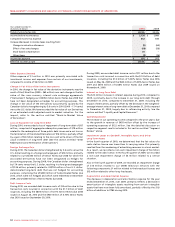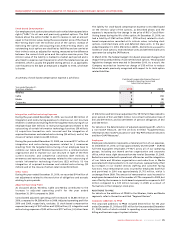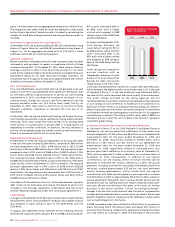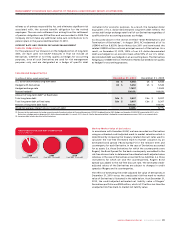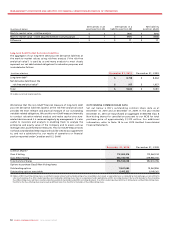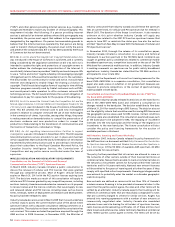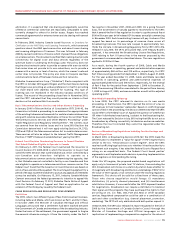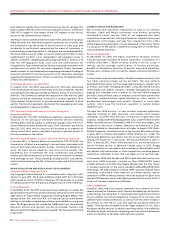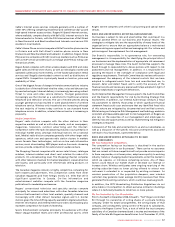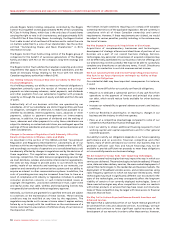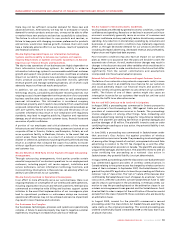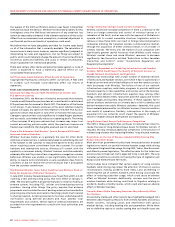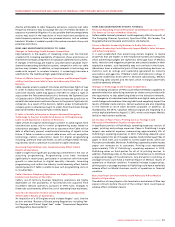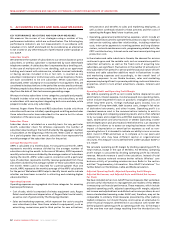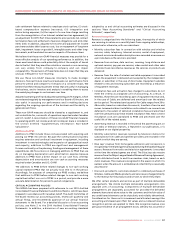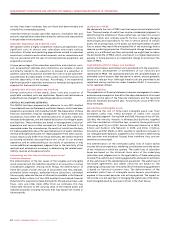Rogers 2010 Annual Report Download - page 50
Download and view the complete annual report
Please find page 50 of the 2010 Rogers annual report below. You can navigate through the pages in the report by either clicking on the pages listed below, or by using the keyword search tool below to find specific information within the annual report.
MANAGEMENT’S DISCUSSION AND ANALYSIS OF FINANCIAL CONDITION AND RESULTS OF OPERATIONS
54 ROGERS COMMUNICATIONS INC. 2010 ANNUAL REPORT
(“ISPs”) and other persons providing Internet services (e.g., Facebook,
Google and Hotmail) to report any incident of child pornography. This
requirement includes the following: if a person providing Internet
services is advised of an Internet address where child pornography may
be available, the person must report that address to the organization
designated by the regulations. If a person has reasonable grounds to
believe that the Internet services operated by that person are being
used to transmit child pornography, the person must notify the police
and preserve the computer data. Bill C-22 has been passed by the House
of Commons but has not been enacted.
Bill C-32, An Act to amend the Copyright Act (Copyright Modernization Act),
was introduced in the House of Commons in June 2010, and is currently
being considered by the Legislative Committee on Bill C-32. Bill C-32 is
intended to update the rights and protections of copyright owners to
better address the challenges and opportunities of the Internet. It
would clarify Internet service providers’ liability and would require ISPs
to use a “notice and notice” regime whereby notices alleging copyright
infringement sent to ISPs would be forwarded in turn to the customers.
The bill provides for cost recovery for notice and notice. It would make
Internet sites designed to enable illegal file sharing a violation of
copyright. The bill would also legalize forms of copying for time shifting
television programs currently used by Cable’s customers such as PVRs,
and would permit cable operators to offer customers network PVR
technology services. The bill would eliminate the current obligation of
broadcasters to pay for copies made for the purpose of broadcasting.
Bill C-51, An Act to amend the Criminal Code, the Competition Act and the
Mutual Legal Assistance in Criminal Matters Act (Investigative Powers for the
21st Century Act), was introduced in the House of Commons in November
2010. This Bill amends the Criminal Code to add new investigative
powers in relation to computer crime and the use of new technologies
in the commission of crimes. It provides, among other things, the power
to make preservation demands/orders to compel the preservation of
electronic evidence and new production orders to compel the
production of data relating to the transmission of communications and
the location of transactions, individuals or things.
Bill C-52, An Act regulating telecommunications facilities to support
investigations was also introduced in November 2010. This Bill requires
telecommunications service providers to put in place and maintain
certain capabilities that facilitate the lawful interception of information
transmitted by telecommunications and to provide basic information
about their subscribers to the Royal Canadian Mounted Police, the
Canadian Security Intelligence Service, the Commissioner of
Competition and any police service constituted under the laws of
a province.
WIRELESS REGULATION AND REGULATORY DEVELOPMENTS
Consultation on the Renewal of Cellular and Personal
Communications Services (“PCS”) Spectrum Licences
In March 2009, Industry Canada initiated a public consultation to
discuss the renewal of cellular and PCS licences that were granted
through any competitive process. Most of Rogers’ cellular licences
expire on March 31, 2011 with the PCS auction licences expiring June
2011. The decisions made as a result of this consultation will apply to
cellular and PCS licences granted by any competitive process, including
auctions. Industry Canada received extensive comments on its proposal
to renew licences and the licence conditions that would apply to new
and renewed cellular and PCS licences, including issues such as licence
terms, renewals, extent of deployment and research and development.
No policy has been released to date.
Industry Canada also announced in March 2009 that it would undertake
a formal study to assess the current market value of the above noted
spectrum licences with a separate consultation seeking comments on a
proposed fee. The study has not been released and the consultation has
not occurred. This review excludes the spectrum acquired through the
AWS auction in 2008. However, in November 2010, the Minister of
Industry announced that Industry Canada would freeze the spectrum
fees at current levels, for cellular and PCS spectrum due for renewal in
March 2011. The duration of the freeze is not known. It also remains
unknown at this point whether Industry Canada will apply any
spectrum fees related to the 2001 PCS auction spectrum licences that
expire in June 2011 or maintain the status quo. See also the section
entitled “Spectrum Fees May Increase With the Renewal of Cellular and
PCS Spectrum Licences”.
In November 2010, through the release of its consultation paper,
Industry Canada initiated a consultation on a policy and technical
framework to auction spectrum in the 700 MHz band. Comments are
sought on general policy considerations related to commercial mobile
broadband spectrum use, competition issues and on the use of the 700
MHz band for commercial mobile services. In addition, Industry Canada
is seeking comments on spectrum use for public safety broadband
applications. Industry Canada has stated that the 700 MHz auction is
anticipated to occur in late 2012.
Noting that the Department will consult on licensing measures for the
band 2500–2690 MHz in a separate consultation, this consultation
paper also seeks views on whether or not government measures are
required to promote competition, in the context of spectrum being
made available in both bands.
Consultation on Transition to Broadband Radio Service (“BRS”) in
the Band 2500–2690 MHz
In June 2010, Industry Canada released its Decisions on the transition to
BRS in the 2500–2690 MHz band and initiated a consultation on
changes related to the band plan. The decision established a firm date
of March 31, 2011 for transitioning to BRS licences. The decision also set
out the eligibility criteria that would be used for issuing BRS licence and
the geographic service areas used for BRS licences. Certain conditions
of licence were also established. The consultation examined issues such
as the band plan to be adopted for BRS, the mapping of incumbent
licencees into the new band plan and the timing of the migration of
incumbents to the new band plan. The future consultation will also
consider the policy and licencing frameworks for the auction of
available spectrum in this band.
AWS Auction, Roaming and Tower/Site Policy
In November 2007, Industry Canada released its policy framework for
the AWS auction in a document entitled Policy Framework for the Auction
for Spectrum Licences for Advanced Wireless Services and other Spectrum in
the 2 GHz Range. Of the 90 MHz of available AWS spectrum, 40 MHz
were set aside for new entrants.
The policy further prescribed that all carriers are allowed to roam on
the networks of other carriers outside of their licenced territories at
commercial rates. New entrants are able to roam at commercial rates on
the networks of incumbent carriers for five years within their licenced
territories and for 10 years nationally. National new entrant licencees
will be entitled to five years of roaming and a further five years if they
comply with specified rollout requirements. Roaming privileges enable
new entrants to potentially enter the market on a broader geographic
scale more quickly.
Newentrantsaredenedascarrierswithlessthan10%ofCanada’s
wireless revenue. Roaming is to be provided at commercial rates. In the
event that the parties cannot agree, the rates and other terms will be
settled by an arbitrator. Industry Canada expects that roaming will be
offered at commercial rates that are reasonably comparable to rates
that are currently charged to others for similar services. Rogers has
entered into roaming agreements with a number of new entrants at
commercially negotiated rates. Industry Canada also mandated
antenna tower and site sharing for all holders of spectrum licences,
radio licences and broadcasting certificates. All of these entities must
share towers and antenna sites, where technically feasible at commercial
rates. Where parties cannot agree on terms, the terms will be set by


